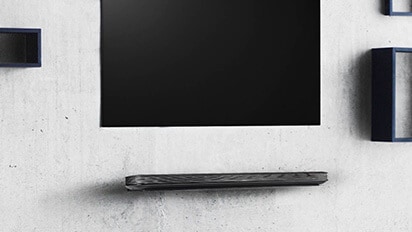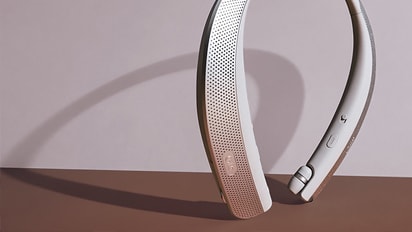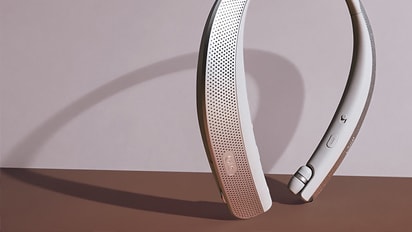- At a Glance
Many common refrigerator noises are due to normal operation of the unit. If the fridge noise becomes louder than normal, follow these simple steps to determine the root cause of the problem.
Try This
- Sound Diagnosis Troubleshooting
-
Sound Diagnosis
During normal operation, refrigerators can make different noises. Below are some examples of common refrigerator noises, press the
to listen to the sound or click the words to see their causes and solutions to eliminate noises that are not associated with normal operation.
Normal Sounds
Abnormal Sounds
Does it make a hissing or gurgling noise?
➔ These are natural sounds that occur when oil and refrigerant flow while the compressor operates inside the refrigerator.
In order to operate various machines, including the refrigerator, without overheating, a refrigerant is necessary to lower the temperature.
This refrigerant is in a liquid state, so it can make [hissing and gurgling] noises just as water flowing down a drain.Does it make a cracking, clicking and water dripping noise?
➔ Cracking, clicking and water dripping noises are natural sounds made by plastic parts such as shelves expanding or contracting when the temperature inside the refrigerator changes.
As the temperature changes, thermal contraction and expansion occur inside the refrigerator, causing a noise.
It's the same principle that makes the cracking sound when ice melts.Right after opening and closing the door fast, do you hear the air leaking sound like a hissing noise?
→ When you open and close the refrigerator door, warm air from the outside enters and cools down so that the pressure inside the refrigerator is lowered temporarily.
At this time, when air escapes at the back, it may create a noise.Warm air from the outside meets cold air inside the refrigerator, creating a difference in the pressure inside the refrigerator.
Air inside the refrigerator escapes through a vent at the back of the refrigerator, creating an air escaping sound.Does it make a rattling, thumping and humming noise?
➔ Rattling, thumping and humming noises are the sounds of the cooling motor (compressor) or the fan when the refrigerator resumes operation after stopping, and when the temperature inside the refrigerator is stabilized, noises will be reduced gradually, just as when you start a vehicle, loud noise and severe vibration occur at first, but the noise and vibration gradually decrease after the engine warms up.
Also, [humming, buzzing, whizzing] noises may be heard in the process of producing cold air.
NoteIf you are still experiencing noises not listed above, service will be required for a proper diagnosis. Please visit our Request a Repair page for further assistance.
-
-
Is the noise coming from the refrigerator or door alarm?
-
When you dispense water, does the noise occur everytime; or briefly as you start and stop dispensing water?
Yes, Everytime No, Only on Start/Stop -
When does the noise occur?
When Opening/Closing DoorsOccasionalAll the Time -
When does the noise occur?
When Opening/Closing DoorsOccasionalAll the Time -
This noise may be coming from the icemaker when the water supply is not connected to it.
The reasons for this sort of noise:
-
During normal refrigerator operation, when the icemaker is turned ON, the refrigerator’s water valve will activate and vibrate for a few seconds as the ice maker requests for water.
-
If the icemaker is turned ON but the WATER SUPPLY IS NOT CONNECTED the refrigerator will make a buzzing or clicking sound that can become louder and more persistent.
How to fix the problem:
-
TURN OFF THE ICEMAKER until you decide to connect a water supply, and this will eliminate the noise you are experiencing.
-
-
This noise is caused when the home water pressure is a bit too high. You can partially close the water valve connected to the refrigerator to decrease the pressure. This will reduce such noise.
How to check the water pressure:
-
Get a standard size coffee cup (8 ounce).
-
Fill the cup with water from the refrigerator's water dispenser.
-
Count how many seconds it takes to fill the cup.
How long does it take to fill the cup?
Less than 4 Seconds More than 4 Seconds -
-
This noise may be caused by the water supply line. The water supply line shifts intermittently as the water valve opens and closes, and can strike the wall or back of the refrigerator, causing a thumping or vibrating sound. In general, this is a normal operation.
To reduce this normal operation noise:
-
Pull the unit away from the wall slightly, or reposition the water line behind the unit to eliminate the noise.
Water supply lines behind the refrigerator
Unit making vibrating sound when it is too close to the wall
Pull the unit away from the wall or reposition water lineDepending on the installation condition, the home water supply line can hit the wall, floor, and refrigerator. Please re-arrange the home water supply line, and check the noise again.
Does this step reduce the noise?
Yes No -
-
The water pressure is TOO HIGH. Adjust the home water valve to reduce the pressure.
How to adjust home water valve:
-
Shut off the water at your house's internal water main.
-
Turn the shut off valve completely to the right (turn water supply off).
-
Loosen the locking nut on the water pressure regulator by turning it to the left.
-
Turn the adjusting screw to the left to reduce the water pressure, or to the right to increase the water pressure.
-
Allow few hours for the refrigerator to regulate, and monitor the noise reduction.
This adjustment depends on your home water valve installation, if you are not sure about how to adjust home water valve, do a quick search on any search engine for this topic, you may also need the help of a plumber for proper adjustment.
Does this step reduce the noise?
Yes No -
-
Your water pressure is NORMAL within 4 seconds and a little more. But if the water takes longer to fill, then the water pressure is too low. Having confirmed that your water pressure is normal, proceed to the next troubleshooting step.
Proceed to Next Step -
Good job, now that we have been able to reduce the noise of your refrigerator, continue the troubleshooting steps to check for other contributing factors that can lead to refrigerator noises.
Proceed to Next Step -
Okay, If you have tried the steps above, but the noise still persists; continue with the troubleshooting steps. There are other contributing factors that can cause refrigerator noises.
Proceed to Next Step -
Determine if the noise is caused by high water pressure or from the water lines.
-
This noise may be coming from the icemaker when the water supply is not connected to it.
The reasons for this sort of noise:
-
During normal refrigerator operation, when the icemaker is turned ON, the refrigerator’s water valve will activate and vibrate for a few seconds as the ice maker requests for water.
-
If the icemaker is turned ON but the WATER SUPPLY IS NOT CONNECTED the refrigerator will make a buzzing or clicking sound that can become louder and more persistent.
How to fix the problem:
-
TURN OFF THE ICEMAKER until you decide to connect a water supply, and this will eliminate the noise you are experiencing.
-
-
Good job, now that we have been able to reduce the noise of your refrigerator, continue the troubleshooting steps to check for other contributing factors that can lead to refrigerator noises.
Proceed to Next Step -
Okay, If you have tried the steps above, but the noise still persists; continue the troubleshooting steps. There are other contributing factors that can cause refrigerator noises.
Proceed to Next Step -
Door hinges, door stopper and proper leveling
Noises that occur when the doors are opening or closing typically do not require a repair service. They are primarily related to door hinges, door stopper and proper leveling.
DOOR HINGES:
Noises from the door hinges may sound like grinding or squeaking.
Recommended solution: Apply a food grade silicon grease to stop the noise. Food grease are availble for sale at local building supply stores. If you are not sure of what to look for, please ask a sales associate to help you find it.
DOOR STOPPER:
A popping sound that occurs while the door is opened or closed can be coming from the auto closing hinge or door stopper. Some models may not have a stopper on the closing hinge.
Recommended solution: For LFC, LFX, or LMX models, the latch on the underside of the refrigerator door may be dirty or dry. Clean the latch and apply a food grade silicon grease to stop the noise.
PROPER LEVELING:
Proper leveling of the refrigerator, and the alignment of the door(s) of the unit are very important for proper operation of the unit.
Steps for proper leveling:
The following steps are snippets culled from our detailed article about proper leveling. Please visit our LG Refrigerator Leveling Instructions page for a step by step guide.
-
Open the refrigerator doors.
-
Place a level on top of the refrigerator to check if the unit is leveled from side to side.
-
If a level is not available, fill a glass half full of water, set it on top of the refrigerator to gauge if the unit is leveled.
-
The refrigerator legs should be adjusted for the unit to have a slight backward slope.
-
Check the door alignment.
-
Even if your refrigerator cabinet is leveled, the doors should be properly aligned too.
-
-
How long does the noise last?
Less than 30 minutesMore than 1 hour -
This noise may be coming from the compressor which is supposed to be normal operation. The noise is not supposed to last more than 1 hour, but if the noise is loud enough to be heard from another room, then the unit requires a repair service.
Before we conclude that the noise occurs all the time and the unit requires a repair service, let's get a closer look at the compressor. There are two types of compressors, the linear compressor and standard compressor.
LINEAR COMPRESSOR:
Units with linear compressors can often be recognized easily by the insignia located on the control panel.
The linear compressor will change speeds according to the needs of the refrigerator in order to cool both the refrigerator and freezer compartments effectively. This change in speed will produce more activity on the compressor, which in turn results to an increased sound. If the compressor goes into a higher speed than normal, it can make noises that resemble buzzing, knocking, or banging.
If this sort of unexpected noise continues for more than one hour at a time, the unit will require a repair service. Please visit our Request a Repair page for a professional service.
STANDARD COMPRESSOR:
The standard compressor will make a low buzzing or humming noise during normal operation. But if the noise becomes louder or can be heard from another room, the unit will require a repair service. Please visit our Request a Repair page for a professional service.
-
Compressor noises are a part of normal refrigerator operation; however compressor noises are not supposed to last longer than 1 hour and should not be loud enough to hear in another room. Let’s take a closer look at the compressor to determine if your refrigerator needs a repair service. There are two types of compressors, the linear compressor and standard compressor.
LINEAR COMPRESSOR:
Units with linear compressors can often be recognized easily by the insignia located on the control panel.
The linear compressor will change speeds according to the needs of the refrigerator in order to cool both the refrigerator and freezer compartments effectively. This change in speed will produce more activity on the compressor, which in turn results to an increased sound. If the compressor goes into a higher speed than normal, it can make noises that resemble buzzing, knocking, or banging.
If this sort of unexpected noise continues for more than one hour at a time, the unit will require a repair service. Please visit our Request a Repair page for a professional service.
STANDARD COMPRESSOR:
The standard compressor will make a low buzzing or humming noise during normal operation. But if the noise becomes louder or can be heard from another room, the unit will require a repair service. Please visit our Request a Repair page for a professional service.
-
This noise may be coming from the compressor. Compressor noises are a part of normal refrigerator operation; however compressor noises are not supposed to last longer than 1 hour and should not be loud enough to hear in another room. Let’s take a closer look at the compressor to determine if your refrigerator needs a repair service
There are two types of compressors, the linear compressor and standard compressor.
LINEAR COMPRESSOR:
Linear compressors can often be recognized easily by the insignia located on the control panel.
The linear compressor will change speeds according to the needs of the refrigerator in order to cool both the refrigerator and freezer compartments effectively. This change in speed will produce more activity on the compressor, which in turn results to an increased sound. If the compressor goes into a higher speed than normal, it can make noises that resemble buzzing, knocking, or banging.
If this sort of unexpected noise continues for more than one hour at a time, the unit will require a repair service. Please visit our Request a Repair page for a professional service.
STANDARD COMPRESSOR:
The standard compressor will make a low buzzing or humming noise during normal operation. But if the noise becomes louder or can be heard from another room, the unit will require a repair service. Please visit our Request a Repair page for a professional service.
-
Persistent noise that stops when the doors are opened is usually caused by the refrigerator fans. The unit uses fans to help circulate air through the compartments. These fans stop spinning when you open the refrigerator doors. If the noise starts to return shortly after you close the doors, then this noise is typically caused by frost buildup around the fan's housing which can be resolved by proper leveling and temperature adjustment.
PROPER LEVELING:
The following steps are snippets culled from our detailed article about proper leveling. Please visit our LG Refrigerator Leveling Instructions page for a step by step guide.
-
Open the refrigerator doors.
-
Place a level on the top of the refrigerator to check if the unit it is leveled from side to side.
-
If a level is not available, fill a glass half full of water, set it on top of the refrigerator to gauge if the unit is leveled.
-
The refrigerator legs should be adjusted for the unit to have a slight backward slope.
-
Check the door alignment.
-
Refer to our LG Refrigerator Leveling Instructions page for a step by step guide.
-
Even if your refrigerator cabinet is leveled, the doors should be properly aligned. If the alignment is off, moisture from the room can enter the unit and cause frost to buildup.
ADJUSTING THE TEMPERATURE:
While checking the leveling and alignment of your refrigerator, you may want to make minor adjustments to the temperature settings. When the refrigerator's temperature is too low, it causes frost buildup (because the unit is unable to warm up to melt the previous frost buildup). Once you've confirmed the unit is leveled, raise the temperature for a couple of days so that the frost will disappear and the noise will stop.
For your convenience, bookmark this page, so that you can return here anytime. If your refrigerator is properly leveled, the temperature is adjusted to remove frost, but the noise still persists, the unit may require a repair service. Please visit our Request a Repair page for a professional service.
Please, DO NOT SKIP this step. Frost buildup on the refrigerator fans will cause noise to your unit if the unit is not leveled properly. Please visit our LG Refrigerator Leveling Instructions before proceeding to the next step.
Did this step eliminate or reduce the noise?
Yes No -
-
Good job, now that we have been able to reduce the noise of your refrigerator, continue the troubleshooting steps to check for other contributing factors that can lead to refrigerator noises.
Proceed to Next Step -
Okay, If you have tried the steps above, but the noise still persists; the unit may require a repair service. Please visit our Request a Repair page for a professional service. But before you request for a repair service, we recommend that you continue the troubleshooting steps because there are other contributing factors that can cause refrigerator noises.
Proceed to Next Step -
Select the type of alarm problem you are experiencing:
Beeps While Doors are Closed Alarm No Longer Works -
To understand why the alarm beeps while the doors are closed, we need to test the alarm.
Steps to follow:
-
Open the refrigerator door and locate the upper hinge.
-
Check if the hinge has a push switch or a reed(magnetic) switch.
-
Test the door switch according to the switch type:
FOR PUSH SWITCH:
-
Visually inspect the upper hinge to make sure that it is flushed against the refrigerator cabinet properly.
-
If it is raised out of position with space, the door may not make contact with the push switch, and the alarm may sound when the doors are closed.
Steps to follow:
-
Push in the door switch to see if the door alarm stops.
-
FOR REED (MAGNETIC) SWITCH:
-
Place a magnet over the switch to see if the door alarm stops.
-
NOTE: The door push switch or magnetic switch is located on the top door hinge of the unit. When the door makes contact with this switch the refrigerator alarm will stop.
Does the alarm turn off?
Yes No -
-
If the alarm stops after manually pressing the door switch or holding a magnet over the reed switch, then the doors are not aligned with the switch.
This can be resolved by leveling the refrigerator, aligning the doors, or both.STEPS TO FOLLOW:
-
Visually inspect the push or reed switch to ensure that sure it is not stuck or damaged.
-
If the push switch was stuck, clean the door switch with warm soapy water to reduce the chances of the door switch sticking in the future.
-
Level your refrigerator and align the doors.
Steps for proper leveling:
The following steps are snippets culled from our detailed article about proper leveling. Please visit our LG Refrigerator Leveling Instructions page for a step by step guide.
-
Open the refrigerator doors.
-
Place a level on top of the refrigerator to check if the unit is leveled from side to side.
-
If a level is not available, fill a glass half full of water, set it on top of the refrigerator to gauge if the unit is leveled.
-
The refrigerator legs should be adjusted for the unit to have a slight backward slope.
-
Check the door alignment.
-
Even if your refrigerator cabinet is leveled, the doors should be properly aligned too.
-
Note: When the unit is leveled and the doors are aligned correctly, check inside the refrigerator to ensure no food items, bins, or drawers are obstructing the door from closing completely.
-
-
If you have tried the steps above, and the alarm noise still persists; the unit will require a repair service. Please visit our Request a Repair page for a professional service.
-
If the door alarm is no longer working, let's test to see if it is turned off, jammed, or requires a technical repair service.
Steps to follow:
-
Check the control panel to see if the door alarm function has been turned off.
-
Open the refrigerator door and locate the upper hinge.
-
Check if the hinge has a push switch or a reed (magnetic) switch.
-
Test the door switch according to the type:
FOR PUSH SWITCH: Push-in the door switch to see if the door alarm turns back on.
FOR REED (MAGNETIC) SWITCH: If you have a reed (magnetic) switch, unfortunately, testing and repairing it requires a technician's help. Please visit our Request a Repair page for a professional service.
NOTE: The door push switch, or magnetic switch is usually located at the top inner part of the unit (this switch is what the door presses when closed, it shuts off the light and triggers the cooling of the unit).
For push switch, does the alarm turn back on?
Yes No -
-
The push switch may be stuck, lift it out gently, and clean the door switch with warm soapy water to reduce the chances of the door switch sticking in the future.
-
This unit requires a repair service. For your convenience, please visit our Request a Repair page for a professional service.
-












